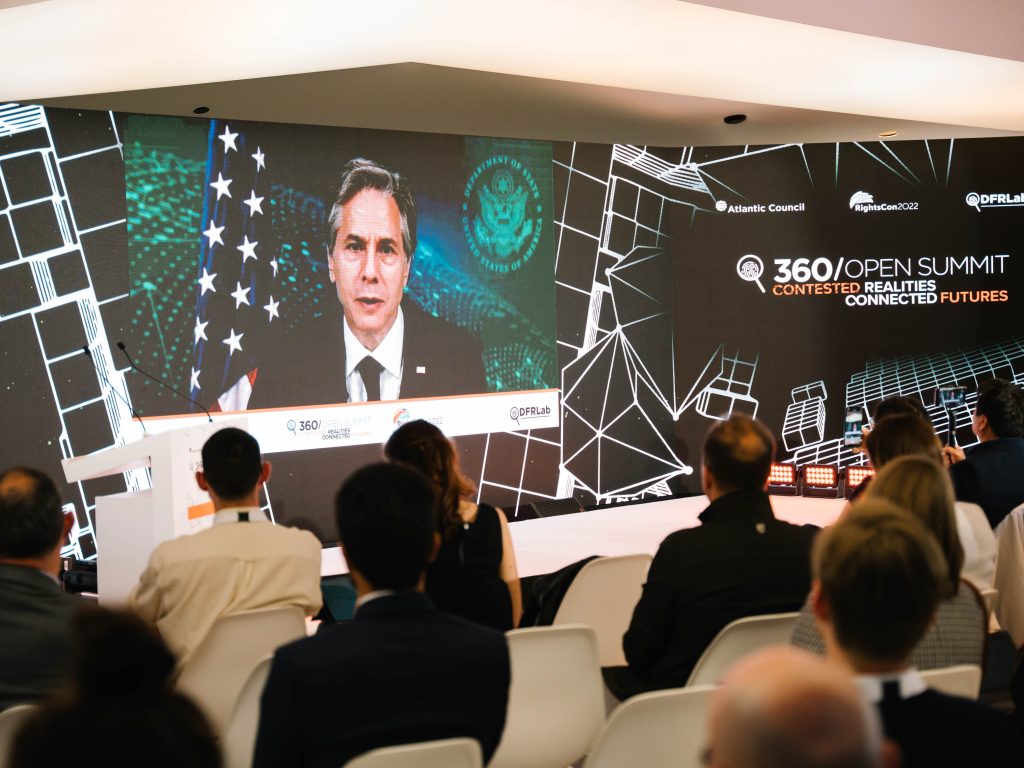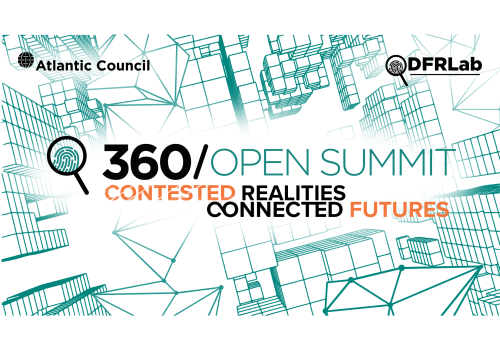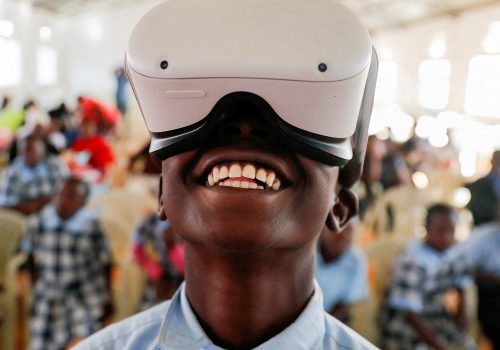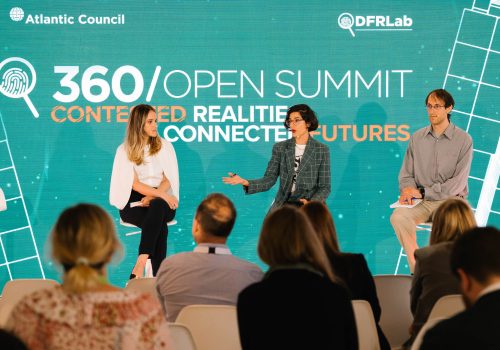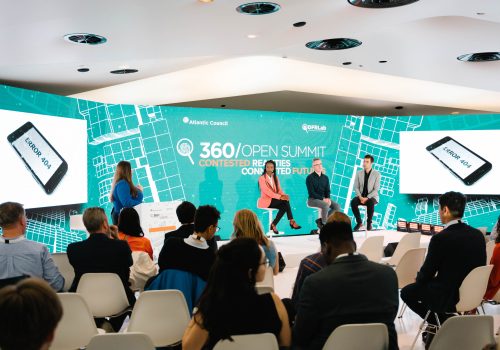Watch the keynote
Event transcript
Uncorrected transcript: Check against delivery
Speakers
Robert G. Berschinski
Senior Director for Democracy and Human Rights, US National Security Council
Maria Ressa
CEO and Nobel Peace Prize Winner, Rappler
Secretary Antony J. Blinken
Secretary of State, US Department of State
ROBERT G. BERSCHINSKI: Hi, everybody. I feel like that was kind of the equivalent of what we’ve all experienced in terms of giving our speech on Zoom with the—with the mute button still on. So thanks. Thanks, Rose. Thanks, Melissa, if you’re still out there, and to everybody at RightsCon. And thanks to DFRLab for putting on this session and for the opportunity to join you to introduce Secretary of State Antony Blinken and Maria Ressa.
It’s been a real pleasure to have spent the last two days participating in discussions at the forefront of democracy and human rights. And I say that, really, with everyone here in mind, but particularly with respect to those truly on the frontlines who have felt the impact for the struggle for human rights and democracy in deeply personal ways. These are women like… Carine Kanimba, someone I had the chance to speak in depth with a couple of nights ago, and also the woman that we’ll hear from shortly, Maria Ressa.
Before we turn to that interview, I want to take a few moments to reflect on what President Biden and so many of you both in the room and at home know is a key challenge of our time: demonstrating that democracy, rather than autocracy, is best poised to deliver for its citizens. In December, as I hope most in the room know, President Biden hosted one hundred governmental leaders, democratic opposition figures, activists, and business and civil society leaders from around the world in what we termed the first Summit for Democracy. Both Secretary Blinken and Maria Ressa spoke at the summit on a panel focused on media freedom and sustainability, and that issue alone reflects the ramifications that technology has had on the world around us.
A free media is, of course, the bedrock of pluralistic discourse and a healthy democratic society. But in—the digital age, as many of you also know, has fundamentally altered the business model that has sustained and enabled independent journalism now for decades. One recent study suggests that the move to digital advertising alone eliminated nearly $24 billion in annual advertising revenue for public-interest media between 2017 and last year, 2021. The economic vulnerability of the media has resulted in its capture and closure around the world. And this trend has, of course, been further compounded by governments who seek to silence critical voices through internet shutdowns, censorship, digital harassment, and political and regulatory pressure that incentivizes acquiescence or leads to media capture. At the same time, digital technologies have enabled individuals, groups, and governments to create, disseminate, and amplify manipulated information for their own political, ideological, and commercial interests.
So now we’re at a point in time where the costs of producing high-quality journalism are high while the costs of disseminating false information and silencing critical voices, like the one we’ll hear from shortly, are relatively low. And communities around the world are being impacted by this every day—not least in the United States, where an estimated quarter of newspapers have closed in just the last fifteen years. And that means fewer local trusted voices informing our debate.
So all of us joining in the 360/OS and in RightsCon are keenly aware of the human-rights impacts of this and other technology-enabled challenges. And while this could be a moment of despair, the breadth of debate, discussion, and participation at events like this reflects another new trend, one where governments and activists and companies are increasingly working together trying to break down their silos to productively design for and mitigate the risks from new technologies. And we know authoritarian governments and other actors will continue to develop and abuse technologies for their own political and financial benefit. We know they seek to rewrite the rules of the international system and the norms that govern technology.
So that’s why the Biden administration is driving an agenda in which critical and emerging technologies work for and not against democratic societies. To give one example, two months ago the United States launched, with sixty of our partners around the world, the Declaration for the Future of the Internet. This is a political commitment among declaration partners to advance a positive vision for the internet and digital technologies.
We’re backing our political commitment with expanded investments to support internet freedom as well as digital safety and security for targeted groups while improving cybersecurity, and in parallel, under the auspices of the Summit for Democracy, we’ve launched hundreds of millions of new dollars in programming to expand our support for free and independent media, to fight corruption, to bolster democratic reformers, and defend free and fair election processes, and in the wake of Russia’s aggression against Ukraine we further expanded our investments in Europe and Eurasia in these thematic areas.
We’re also working to more effectively hold to account those who abuse technology to unlawfully surveille and harass human rights defenders, journalists, and opposition leaders, just as Melissa was mentioning in the intro in terms of the discussion at RightsCon.
Yesterday, panelists stood on this stage and detailed harrowing accounts of being targeted via commercial spyware technology among other forms of what we in the US government are increasingly referring to as transnational repression.
The United States views the unlawful or inappropriate use of this technology as a national security issue. So in October of last year, we updated our export control rules governing items that can be used for malicious cyber activities, and then in November we added four foreign companies, including but not limited to NSO Group, to the Department of Commerce’s Entity List, based on evidence that these firms developed and supplied spyware to foreign governments that then used the tools provided to maliciously target government officials, journalists, business people, activists, and embassy workers, and we intend to do much more in this space using all the tools at our disposal.
At the same time, we’re placing renewed emphasis on supporting multi stakeholder initiatives like the Freedom Online Coalition and the OSCD’s work on reinforcing democracy.
Just over one year ago, we joined the Christchurch Call to eliminate terrorist and violent extremist content online, and then in November we announced our support for the Paris Call for trust and security in cyberspace. And we’re working also with key allies and partners on new initiatives like the global partnership for action to end online harassment and abuse, and, as those here in Brussels know well, the US-EU Trade and Technology Council.
Yet, we know that no single commitment, program, or action is going to resolve all of the challenges that we’ve been discussing over the course of the last few days and that we’ll hear momentarily from the US Secretary of State.
Russia’s aggression in Ukraine underscores the importance of taking a holistic approach to continuing threats to democracy diplomatically, militarily, economically, and in the information realm. But by working together, by doing exactly what all of you are here doing today, governments, advocates, researchers in the private sector together across disciplines, regions, and responsibilities, we can and we are driving change that’s going to prove to be asymmetrically advantageous for democracies.
We’re pursuing efforts to close the gap in digital access and driving innovation in ways that are going to foster inclusion, equity, and accountability, and support human rights rather than undermining them.
So, momentarily, Secretary Blinken will provide more on the breadth of efforts that the US is taking to advance this agenda in his interview with Maria Ressa. Maria and her team at Rappler and so many other journalists, human rights defenders, and activists, including many of you here in Brussels and online, have demonstrated courage and commitment against a global tide of democratic backsliding.
So with that, I’m very pleased to announce a woman who epitomizes courage and conviction, Nobel Peace Prize-winning journalist Maria Ressa, in conversation with the US Secretary of State Tony Blinken.
Thank you.
MARIA RESSA: Hello, everyone. Thank you so much for joining us. I am Maria Ressa from the Philippines. What an honor to have US Secretary of State Antony Blinken with us today at a crucial moment for all of us working for a better digital rights world.
Secretary Blinken, thank you for joining us.
ANTONY J. BLINKEN: Maria, great to be with you and great to be with everyone.
This is really a pleasure for me. I’m thrilled to be hosted by RightsCon, to be talking to you. I want to say greetings to everyone from the 360/Open Summit and from around the world who is, in one way or another, logged on, tuned in, and joining this conversation.
You know, it’s so important from our perspective that the United States, likeminded governments—but especially with civil society, with nongovernmental organizations, with think tanks, with the private sector—work to protect human rights online, work to demonstrate that our democracies can deliver for people as we navigate this extraordinary digital transformation that is having an impact on the lives of virtually everyone on this planet.
One thing I wanted to say at the outset, before we get into the conversation, is I am very pleased to announce that for the first time the United States will become chair of the Freedom Online Coalition in 2023. We want to strengthen the coalition. We want to bring more members on board. We want to make it a center of action for ensuring a free and open digital future. And this in part is going to be building on Canada’s terrific work as the current chair and really trying to carry it forward. So I’m really pleased to do that, to be able to announce that.
And Maria, it’s great to be with you. You have been, you are, an extraordinarily courageous champion of freedom of speech, freedom of press and media, and freedom for a digital future that we all want and we hope to build together. So thank you for being willing to have this conversation today.
MARIA RESSA: Well, you know, that’s really great to hear from you, Mr. Secretary, exactly at this moment in time when, you know, it seems at times hopeless. And you never want to be hopeless, right.
So let me ask you—you’ve been very outspoken about the way digital authoritarians have used tech to abuse human rights; you know, a growing trend that people like us on the front lines increasingly defenseless. I mean, what have you seen globally? And what can you do about it?
ANTONY J. BLINKEN: So you’re right. Unfortunately, that’s exactly what we’re seeing.
Look, I think, as in so many ways, when we saw the emergence of a lot of this technology, starting mostly in the 1990s, the early 2000s, I think there was great hope that it would be inexorably a force for openness, transparency, freedom. And, of course, in many ways it is. But we’re also seeing, of course, the abuse of this technology in various ways, including by repressive governments trying to control populations, to stifle dissent, to surveil and censor. We see that, of course, in the PRC with technology being used, for example, for mass surveillance, including of the Uyghurs and other minorities.
So the question is, what is to be done? What do we do about it? And there are a number of things that we need to do and, in fact, that we are doing.
One is to start by calling things out. That’s often the basis for everything. We have to call out the abusive technology, including digital authoritarianism.
Second, as I mentioned, we’re going to be taking on the chairmanship of the Freedom Online Coalition. We’re working to strengthen it. And this is an important vehicle to try to protect and advance internet freedom and to push back against digital authoritarianism.
Very practically speaking, there are a number of things that we—countries, nongovernmental organizations, and others—are doing to, for example, get anti-censorship technology into the hands of people who need it so that they have the tools to push back against the misuse of technology in an authoritarian way. We set up a multinational fund to do that at the Summit for Democracy that we hosted last year; and then, for example, putting export controls on surveillance technology to make sure that technology that we and other countries are producing that could have a dual use and be misused for the surveillance of populations, that doesn’t get into the wrong hands.
That takes working together. One country alone can’t do it. And, in fact, governments alone can’t effectively do it. We need to build these coalitions to make sure that we identify where technology should not go because it’s being misused, and then we’re together to make sure that it doesn’t get there.
MARIA RESSA: Yeah, I agree with working together. Mr. Secretary, you know that early on I said that the tech platforms that took control—became the gatekeepers from journalists abdicated responsibility for protecting the public sphere. And in some ways it’s taken so long to get government regulations that, in a way, governments have also abdicated responsibility. We’re just starting to see the beginning of this rollout in the spring from the EU, right.
And yet we know the impact of disinformation. In the Philippines we have seen disinformation repeatedly change our history. It’s that Milan Kundera quote; you know, the struggle of man against power. Well, we’ve forgotten really quickly. And disinformation is being used to manipulate our biology.
Where do you see—what can you do about this? And how do we fight back, given that there are more than thirty elections this year? And you can’t have integrity of elections if you don’t have integrity of facts.
ANTONY J. BLINKEN: Couldn’t agree with you more. And, you know, this has been one of the other changes that we thought was going to be totally for the good, but, of course, that hasn’t been the case.
In the United States a few decades ago, information that most people used in their daily lives, there was a common foundation, because there were actually a fairly limited number of sources of the information that people got. We had three television networks back then. We didn’t have cable. We didn’t have an internet. We didn’t have talk radio, et cetera, et cetera. And the hope, of course, was that the democratization of information would be a good thing overall. And fundamentally I believe that’s still the case.
But as a result of this, as a result of this disaggregation, you’ve lost exactly what you said, which are sort of the trusted mediators who can make sure that information, to the greatest extent possible, is actually backed up by the facts. And at the same time, the technology itself has allowed the abuse and the spreading of misinformation and disinformation in ways that we probably didn’t fully anticipate or imagine.
So we see authoritarian governments using this. We see it, for example, right now in the Russian aggression against Ukraine. We saw it in 2014 when Russia initially went at Ukraine and was using information as a weapon of war. So in that particular instance and in this instance, we’ve actually reversed this on them, precisely by using information, real information, to call out what we saw them preparing and working to do.
And being able to do that and to bring to the world everything that we were seeing about the planned Russian aggression, and to lay out exactly the steps they were likely to take, and which unfortunately they did, I think, has done a profound service to making sure that credible information is what carries the day and disinformation is undermined.
But there are a number of things that we can here again and we are doing to combat the misuse of information. Again, we start by exposing it. And we start by sharing the information that we have, working with others, again, in a coordinated way. We have at the State Department something called the Global Engagement Center, which is focused intensely on finding, exposing disinformation, the techniques that are used by those who are propagating it, and in a coordinated way, working with other countries, pushing back on it and giving people the tools to do it.
It’s critical for us that we also build the capacity of partners around the world, both governments but also journalists, nongovernmental organizations, civil society. There are a number of things that we’re doing. We have initiatives to help give people fact-checking tools to make sure that the information that they’re getting actually is backed up by the facts and to show when it’s not.
Digital literacy training, which is so critical to understanding what people are consuming and being able to separate the wheat from the chaff, the true from the misinformation and disinformation.
Bolstering independent media. This is so critical. The single best check and balance against misinformation and disinformation is an effective, independent media. And we have initiatives to do that, including, as appropriate, financing and other things.
We see that there’s a deliberate attack to take down independent media, to take down nongovernmental organizations that are operating in this space. So we’re putting in place protections. For example, countries actually try to use legal means—or I should say legal in quotation marks—legal means through lawsuits, as you know very well—
MARIA RESSA: Yes.
ANTONY J. BLINKEN:—and through regulatory challenge. Well, we’re putting in place programs, funding, to enable people, institutions, media organizations, to actually push back on that. All of these things together are part of what we need to do.
And finally, it’s so critical that we and you, this entire community, work with the platforms to find ways to more effectively ensure that they’re not being abused and used as a means of propagating misinformation, disinformation. Of course, it’s primarily on the platforms themselves to take the steps necessary to push back against that. I hope very much that we can continue to do that in a collaborative fashion. And sharing the information, what we’re seeing, for example, with the platforms, we’ve found that when we’ve been able to point them to malicious actors using the platforms in abusive ways, they’ve been responsive in making sure those actors can’t do it. But of course, it’s a moving target. And for every bad actor that you take off, maybe it comes back under another guise or something else pops up. So we have to be vigilant. We have to be relentlessly focused on this. And I hope that we can do this in a cooperative or collaborative way.
MARIA RESSA: Well, that’s certainly what we’ve been trying to do. But what we’ve seen in the last—you mentioned 2014 until now, right? The disinformation, the splintered reality that allowed Russia to annex Crimea, and then eight years later to invade Ukraine, those meta-narratives were seeded, the platforms were told about it, not much was done. And the question, of course, is would we be at this place if more was done, right?
But I guess this is—this does to the last—the crucial question, which is: We have had impunity in the virtual world. And that impunity, you have one-thousand-page document from the Senate that outlines what Russian disinformation did in 2016 in the United States. That impunity has filtered in the real world, and really severed the checks and balances that are there. I guess the—and here, to quote Shoshana Zuboff, where she just says: We live in one world.
And if you don’t have rule of law in the virtual world, you know, how can you have rule of law in the real world? And this goes back to what is your democratic vision? I think that’s what’s been missing, is that we don’t have a democratic vision for the twenty-first century with this technology that we have. What is that you have?
ANTONY J. BLINKEN: Yeah, Maria, I think you’re exactly right. And first, let me say, look, we’ve been awoken to this challenge over the last years. And I think for me it certainly started particularly in 2014 with the initial Russian aggression against Ukraine, and the use of misinformation and disinformation as a weapon to war, as critical to their campaign. And then, of course, we saw the interference in our elections. And all of that has created a—I think, an increasingly greater consciousness of the challenge, and the need to do something about it.
But doing something about it starts with exactly what you said, which is advancing a positive vision, an affirmative vision of what this future should look like. A vision of an open, free, global, interoperable, secure, reliable internet. One of the ways we’ve done that is with this declaration for the future of the internet that now some sixty countries have joined onto, that actually lays out what this positive vision is. We’re working in concrete ways, though, not just to put out the vision, but to realize it.
MARIA RESSA: So what are the concrete steps that you’re taking?
ANTONY J. BLINKEN: So much of the work that we’re doing is to make sure that we, and other likeminded countries, are at the table when so many of the rules and norms that are going to shape the future of the internet are being decided. And we’re doing that in a variety of ways. We’ve come together with the European Union through something we’ve stood up called the Trade and Technology Council, to make sure that we’re working together to advance these different norms and standards. There’s growing convergence between the United States and the European Union on this vision for the future. Now we put that in practice by bringing our combined weight together everywhere these rules and norms are being shaped.
We’re making sure that we’re investing in our own capacity to do that. Here at the State Department over just six months we stood up a new bureau for cyberspace and digital policy. We will soon have a senior envoy to deal with emerging technologies to make sure that to the extent values are infused in technology, they’ll be liberal values not illiberal ones, and making sure that technology is used for the good and to advance democracy, not to—not to undermine it.
We’ve been working to make sure that after last year’s Summit for Democracy we make this year a year for action in terms of implementing many of the concrete initiatives that were announced at the summit, including some that I mentioned a short while ago in terms of supporting independent media, giving people the tools they need to combat censorship, making sure that journalists and other organizations under siege can fight back and have the tools and the means to do so.
We, as I mentioned, have initiated a declaration for the future of the internet with sixty countries so far, making sure that we’re all aligned in a shared vision and trying to advance it. And finally, the institutions that are actually doing this work, that are deciding how all the technology that we share is being used, it’s hugely important that people who share this vision, share these values, are running these institutions.
There’s a hugely important election for the head of the International Telecommunications Union coming up. And the candidate we support, Doreen Bogdan-Martin, is someone of vision and of value who can help advance this shared perspective that we have. So it’s one of those—one of those things where probably 99.999 percent of people have no idea what the ITU is or how important this election is, but we’re very focused on it, and making sure that someone with a shared vision can drive this forward.
Last thing I’ll say, Maria, is this: I think everyone present today is at the heart of this effort. Civil society, nongovernmental organizations, the private sector, independent media working together, holding governments to account, and then ideally all of us joining forces. When you put all that together, it’s a very powerful force, and it’s one that I’m convinced can carry the day in making sure that the future of technology and the future of the internet is on that actually advances freedom, that advances democratic principles, and that makes sure that together we can build a future that reflects the values that we share.
So the work that every single one of you is doing in ways big and small, that’s what really counts. And I’m just pleased for the opportunity to spend a few minutes talking about how we see it, how we think about it. Especially, Maria, with you. So thank you.
MARIA RESSA: No, thank you so much, Secretary Blinken. Can I quick—just one quick question, because you—
ANTONY J. BLINKEN: Of course.
MARIA RESSA: So you mentioned leaning in. Sheryl Sandberg just said that she would be leaving Meta this—at the end of this year. These are American companies that did have values that were infused into their design—and, again, probably not by their design—but encouraged the death of democracies in many parts of the world. In Norway just last week, I kind of thought the next two years will be critical for the survival of democracy. And there were people from Kyiv, from Ukraine who really said that they received the most help from ordinary people. You’ve just asked us all to work together. I guess, you know, is there a timetable? You know, long term, yes, education. Medium term, yes, laws. In the short term, how can we stop what Anne Applebaum called Autocracy, Inc. from taking over in this period of chaos?
ANTONY J. BLINKEN: Maria, I think we all have to be seized with the fierce urgency of now. And, yes, many of the things that we’re talking about will play out over time. Much of this is not flipping a light switch or turning on or off a computer. It does take time. But if we bring to it together a sense of—a sense of urgency and a sense of determination, that’s hugely important. And if this entire community is galvanized, I think we can make—we can make a real difference. But that requires day-in and day-out vigilance. It requires day-in, day-out action. And I think what we’ll see, if we—if we do it right and do it in a sustained way, is you take a step and you look and it doesn’t look like you’ve traveled very far. But my hope and expectation is that over the next few years we will take many steps together and we’ll actually recognize that we traveled a great distance.
The hard reality that we face, and it’s a cliché but it’s profoundly true, technology itself isn’t inherently good or bad. How it’s used determines whether it’s for the good or for the bad. And if we marshal all of our forces together, I think we carry a great weight into this fight to make sure, to the best of our ability, that technology is used for the good. That it’s used to advance a more open, more free, more democratic world. And that it’s not misused and abused to undermine those basic principles. But I think we have to have exactly what you’ve said, a real sense of urgency about that, a real sense of vigilance, a determination to call out misuse and abuse, a determination on the part of nongovernmental organizations and civil society to hold governments and hold the private sector to account. And I’m—I remain optimistic that, marshalling all of these forces together with that sense of urgency, we can make a difference and we can shape a future that is more open, more tolerant, and actually supports and defend freedom and democracy and doesn’t undermine it. That’s the objective.
But look, we have to show, all of us in different ways, that we can actually deliver on this. So I recognize declarations are good. Calling things out are good. But what really counts is action that makes a change, action that deals with the problem. None of that is easy, but we’re determined to do it and we’re determined to do it together.
MARIA RESSA: Fantastic. Thank you so much for your time, Secretary Blinken.
ANTONY J. BLINKEN: Thanks, Maria.
Watch the full event
Further reading
Mon, Jun 6, 2022
What happens when toxic online behavior enters the metaverse?
Transcript By
As technology and reality intersect, policymakers are going to need to prepare for a world integrated with virtual and augmented reality.
Tue, Jun 7, 2022
Moderating non-English content: Transparency and local contexts are critical
360/OS By Layla Mashkoor
The decisions made by content moderators and algorithms have significant impacts, not only in online information spaces but also offline.
Mon, Jun 6, 2022
Spyware like Pegasus is a warning: Digital authoritarianism can happen in democracies, too
New Atlanticist By
Journalists and citizens targeted by spyware warn the audience at the Digital Forensic Research Lab's 360/Open Summit about the proliferation of state-sponsored digital surveillance.
